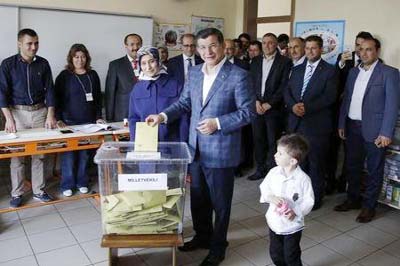
AFP, Istanbul :
Turks went to the polls Sunday in the most-closely fought legislative elections since the Islamic-rooted ruling party came to power 13 years ago, in a crucial test for President Recep Tayyip Erdogan’s plan to win greater powers.
The election is taking place under the shadow of violence after two people were killed and dozens more wounded in an attack on a rally of the pro-Kurdish People’s Democratic Party (HDP) in the southeastern city of Diyarbakir on Friday.
Ballot stations opened at 0500 GMT and will close at 1400 GMT, with over 53.7 million Turks eligible to vote. Opinion polls predict that the ruling Justice and Development Party (AKP) co-founded by Erdogan will again win the most votes, but its share could be sharply down on the almost 50 per cent it gained in the last such vote in 2011.
Turkey’s economy is no longer firing on all cylinders, with growth slipping under three percent and unemployment ticking up.
And concern is growing over the alleged authoritarian tendencies of Erdogan, who ruled as premier from 2003-2014 before taking on the post of president, with an upsurge in cases against journalists and other members of the public accused of insulting him.
Erdogan wants the AKP to win a two-thirds majority in seats, which would be enough to agree a new constitution to change Turkey from a parliamentary to a presidential system where the head of state is enshrined as number one.
He argues this would be little different from democracies like France and Brazil and change an old constitution that has its origins in a 1980 military coup. Opponents fear it could mark the start of one-man rule.
However the opposition HDP, expected to come fourth, could scuttle his plans if it wins over 10 percent of the vote and surpasses Turkey’s notoriously harsh threshold for sending MPs to parliament.
A strong showing from the second-ranked secular Republican People’s Party (CHP) and third placed Nationalist Movement Party (MHP) could even force the AKP to form a coalition to stay in power for the first time since it came to office in 2002.
The attack on the HDP in Diyarbakir, caused by a bomb stuffed with ball bearings, was just the latest against the party in the campaign as it tries to break into the mainstream of Turkish politics.
Turks went to the polls Sunday in the most-closely fought legislative elections since the Islamic-rooted ruling party came to power 13 years ago, in a crucial test for President Recep Tayyip Erdogan’s plan to win greater powers.
The election is taking place under the shadow of violence after two people were killed and dozens more wounded in an attack on a rally of the pro-Kurdish People’s Democratic Party (HDP) in the southeastern city of Diyarbakir on Friday.
Ballot stations opened at 0500 GMT and will close at 1400 GMT, with over 53.7 million Turks eligible to vote. Opinion polls predict that the ruling Justice and Development Party (AKP) co-founded by Erdogan will again win the most votes, but its share could be sharply down on the almost 50 per cent it gained in the last such vote in 2011.
Turkey’s economy is no longer firing on all cylinders, with growth slipping under three percent and unemployment ticking up.
And concern is growing over the alleged authoritarian tendencies of Erdogan, who ruled as premier from 2003-2014 before taking on the post of president, with an upsurge in cases against journalists and other members of the public accused of insulting him.
Erdogan wants the AKP to win a two-thirds majority in seats, which would be enough to agree a new constitution to change Turkey from a parliamentary to a presidential system where the head of state is enshrined as number one.
He argues this would be little different from democracies like France and Brazil and change an old constitution that has its origins in a 1980 military coup. Opponents fear it could mark the start of one-man rule.
However the opposition HDP, expected to come fourth, could scuttle his plans if it wins over 10 percent of the vote and surpasses Turkey’s notoriously harsh threshold for sending MPs to parliament.
A strong showing from the second-ranked secular Republican People’s Party (CHP) and third placed Nationalist Movement Party (MHP) could even force the AKP to form a coalition to stay in power for the first time since it came to office in 2002.
The attack on the HDP in Diyarbakir, caused by a bomb stuffed with ball bearings, was just the latest against the party in the campaign as it tries to break into the mainstream of Turkish politics.

